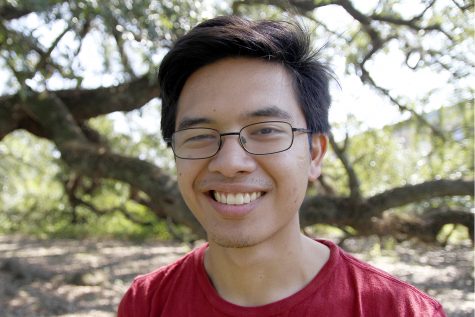
Professor of Political Science Dr. Margaret Gonzalez-Perez discusses the myth of Spanish neutrality during World War II. Zachary Araki/The Lion's Roar
The department of history and political science invited a scholar and a Women’s History Month lecture veteran to speak about the myth of Spanish neutrality during World War II.
The lecture was held in the Student Union Theater on March 20 at 11 a.m. Professor of Political Science Dr. Margaret Gonzalez-Perez is a frequent speaker for the department’s lecture series, previously speaking on topics such as women in science or women and terrorism.
“I always enjoy doing the Women’s History Month lectures,” said Gonzalez-Perez. “This year we’re doing World War II theme for all of our department lectures, so that’s why I’m doing Spanish neutrality. Typically, in the past, I’ve done women in developing nations or reproduction or certain issues in specific countries like the Magdalen girls in Ireland.”
While she was in college, Gonzalez-Perez settled on studying political science.
“I double majored in Spanish literature and political science,” said Gonzalez-Perez. “I liked both of those. Both were very interesting. And then I went on to get a master’s degree in literature, and I realized when I was studying literature of Spain, what really intrigued me about the literature was the political subtext.”
Gonzalez-Perez went on to earn her doctoral degree from Louisiana State University. In 2016, she earned both the President’s Award for Excellence in Research and the Arts, Humanities, and Social Sciences Award for Excellence in Research.
“Once I went to graduate school, I realized you don’t focus on one single thing, that you have to understand the developing world and foreign policy and how the U.S. interrelates with China and India and Russia,” said Gonzalez-Perez. “I became much more interested in all of those things.”
Junior political science major Jordan Chatman talked about the lecture.
“The lecture was actually pretty interesting,” said Chatman. “They talked about the Spanish and Germany relationship in World War II, which was the Spanish were really trying to make friends with Germany and they really supported Germany, maybe not 100 percent, but maybe 70 percent. They were trying to put their country on the map as well.”
Chatman attended the lecture for more than a class.
“We were given extra credit for one of our classes, but it’s also interesting because it’s my major,” said Chatman. “I’m deeply interested in government, politics and the history of international relationships.”
According to Gonzalez-Perez, the temporal distance from World War II contributes to the rise of “alt-right” groups. She shared her thoughts on the department focusing on the war for its lecture series.
“It’s something that students aren’t necessarily that aware of,” said Gonzalez-Perez. “I think sometimes people my age forget that. My father fought in World War II, so to me, I understand what it was, but now, that’s so far removed. It’s so long that I don’t think students have a real understanding of it.”


